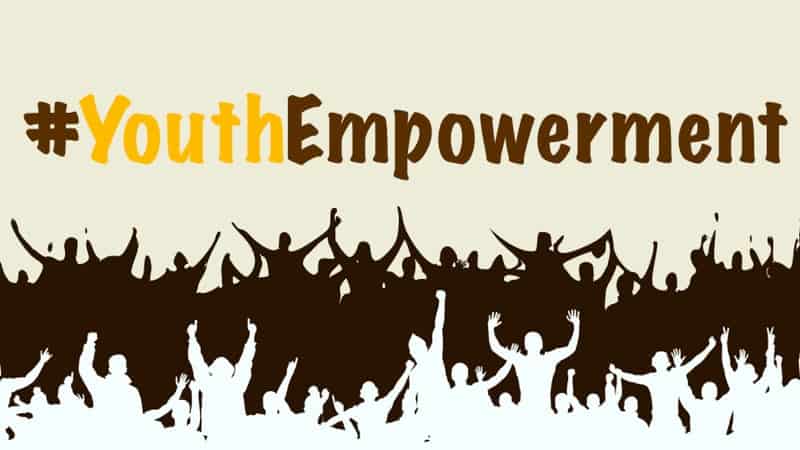Meaning of Youth Empowerment and Youth Empowerment Skills (Civic Education)
What is empowerment?
Empowerment is an economic and labour term that means giving someone or a group of people who are physically and mentally healthy the skills and knowledge they need to take part in the use and distribution of economic and social resources for their own good and the betterment of our society.
This means that to empower a person is to teach, train, or give him a way to make a living or a skill that will help him live the best life possible in that society. It means getting someone started in a job or career that can help him or her deal with problems like poverty, lack of resources, and idleness.

Ways Of Empowering People
1. Education
This means giving them the chance to get the basic education they need. Basic schooling teaches people how to deal with problems in life and how to get along with other people.
The UBE Act of 2004 says that the main goal of the Nigerian basic education system is that:
“Every learner who has gone through nine years of basic education should have the right level of mathematical, literacy, manipulative, communicative, and lifelong skills, as well as the social, moral, and civic values required to establish an excellent foundation for lifelong learning, as the basis for scientific and reflective reasoning.
2. Entrepreneurial Skills training
This means training them in different trades, jobs, and careers. The point of education is to teach you something useful. Some people have an array of skills and can learn more skills to make more money. Others must have a job to make money. A person can work as an artisan, a semi-skilled worker, or a skilled (professional) individual.
People like shoe repairers, street sanitation workers, laborers, sellers, peasant farmers, etc. are all considered artisans.
Semi-skilled people include taxi drivers, carpenters, tailors, technicians, etc., while skilled people include teachers, engineers, medical professionals, bankers, priests, managers, technological professionals, computer scientist, and many more.
3. Indoctrinating Them
Indoctrination is the process of teaching someone how to develop a survival and sustenance habit. It is a process that helps him learn good values, morals, and faith in God and society, as well as the discipline he needs to deal with the responsibilities of life.
Moral and social values stay at the center of a person’s conscience, guiding him to live a meaningful life and use every opportunity within his reach for self-improvement and service to the society.
Concept of Youth Empowerment
Nigerians had what is called a “traditional” or “informal” schooling even before the British colonists came. Families taught their kids and relatives how to do the occupations that the family was known for.
In some places or situations, children were also trained for jobs that they chose or that their parents thought they would be best at. Everyone was supposed to have a skill, whether they were able or not. Some of the common skills back then were agriculture, fishing, sculpting, trade, trado-medicine, orthopedic or bone setting, crafting, wine tapping, forecasting, hunting, black-smiting, trading, etc.
As society advances, the white man’s system of education, business, trade, and investment is brought in. As a result, new skills are needed to fit modern wants and environments, and it becomes clear that people need to be taught these new skills. Some old skills are no longer useful because current technology, techniques, and science have made them obsolete.
Especially Young people needed to be empowered with the skill they needed to deal with the new situation. If they didn’t, they risked becoming useless, unimportant, and out of date.
The government pushed for the construction of modern schools, labs, centers for learning new skills, workshops, and professional centers. People in Nigeria need to learn new and better skills if they want to compete with other nations of the world. This is because science and technology are always finding novel approaches to do things and interacting with other people.
Empowerment programs are still one of the most important things the government does to help prepare young people and keep them up-to-date on useful skills. This helps the government keep its development programs going. People need these Empowerment Programmes to help them do the following:
The need for Empowerment
1. Solve problems of nature: You need skills to solve problems, and only people with good skills can get jobs and get paid well. Gainful work is one of the best ways to help people get out of poverty and helps the economy and society grow.
2. Environmental development: People with adequate abilities can build roads, build modern houses, set up parks and leisure centers, make their environment look nicer, and so on.
3. Fight boredom and restlessness: Empowering people gives them a feeling of patriotism, satisfaction, and self-fulfillment. This, in turn, leads to peace and order because people have jobs. It makes people less likely to engage in conflicts.
4. Encourage youngsters to be resourceful, develop their talents, be innovative, and take the lead.
5. Teaching the younger generation new skills make them feel more committed to advancing the country.
6. Have a good place to learn how to become leaders, how to follow, and how to run an organized society.
7. To discourage and try to stop bad habits like prostitution and armed robbery. Touting, begging, and other things that only society rejects do.
8. Make it easy to run the government. If people don’t have jobs and aren’t aware of their duties, it might be hard for the government to get the money or taxes it needs to start projects and programs that will help the people.
Youth Empowerment Programmes and Initiatives in Nigeria
Youth Empowerment is an idea or set of programs that help young people learn new skills, trades, or jobs. It is an important component of what training and education are all about.
When you educate young people, you give them more power over their minds, their senses, and their ability to manipulate things. You also teach them how to build and use skills that will last a lifetime.
Youth Empowerment usually means training the youths.
Youth Empowerment can be seen as a way to deal with or try to solve Nigeria’s developmental problems. The goal of Youth Empowerment is to build a solid foundation for reducing poverty, creating jobs, making money, and changing people’s ideas about what’s important.
The concept of youth empowerment emerged when Nigeria saw the extent of socio-economic and political degeneration was reaching an alarming stage where oil bunkering, ritual murder, kidnapping, rebellion ballot box snatching, fabrication of election results, thuggery, automobile theft, terrorism, open day robbery, fraud in the high and low positions including those on highways, etc, created significant barriers to the development and advancement of the country.
In 1987, the federal government of Nigeria set up the National Directorate of Employment (NDE), which is in charge of the Youth Empowerment Schemes. In 1999, the National Poverty Eradication Programme (NAPEP) took over the same job.
In 1999, the Federal Government came up with a plan for transforming the economy called (NEEDS) National Economic, Empowerment, and Development Strategy. Designed to bring about economic changes, growth, and development by improving all of the economy’s different parts.
The main goal of NEEDS was to offer young people empowerment skills.
NEEDS has four major goals, some of which are:
1. Poverty Reduction and Eradication Strategy: This plan is meant to meet the basic wants of the people and lower the level of poverty in a way that will last. It gave people chances and made it easier for them to improve their financial standing.
2. Creating jobs: This is done by learning skills and training that can be used for the rest of their lives.
3. Value Orientation: By changing and re-orienting our value system via the National Orientation Agency (NOA) for promoting some virtues and values like honesty, discipline, diligence, selfless service, a sense of duty and good moral upbringing in the people.
4. Making money and giving people more empowerment through education.
NEEDS is also making it possible for people, especially young people, to get involved in the production of products and services, which will make the citizens (especially the young people) and the country richer.
NEEDS puts a lot of investment in education as a way to empower people through training, skill-building, and formal education. When citizens are educated, they think positively, create things, and come up with ideas and actions that are good, useful, and productive. This makes them healthy, stronger, self-sufficient, and able to hire workers.
The NDE and NAPEP schools are on track with their plans to help young people get ahead. They admit unemployed young people to learn different skills and trades.
When they graduate, they are helped to set up their own work space or business centers so that they can be financially independent and successful.
Through the programs, many young people have learned how to style hair, weld, operate heavy machinery, drive a motor vehicle, print and publish, bookbind, raising chickens, drawing, art, etc.
These and a lot of other things give young people the ability to take part in their community’s economic development and growth, making them feel like they belong and are important.
Why should young people be empowered alongside adults?
Any or all of the following can be the answer to the question above.
- To get ready for a generational or paradigm shift in an effortless manner.
- To give positions and duties to young people and future leaders, which will help them become better leaders.
- To introduce them to the society and experiences of being an adult.
- To give them goals, values, and responsibilities to work toward.
- To make them comfortable on a mental, psychological, and interpersonal level and make them gain a sence of belonging
- So that they can take advantage of the creative skills of young people, such as information and community technology (ICT).
- To give them the tools they need to work with the government’s goal, mission, and programs.
- To help them think about becoming the best version of themselves.
Youth Employment Skills
The educational system was changed so that children and young people could learn more skills and be better prepared for a prosperous future. The curriculum was reviewed and reorganized to make it fit with the strategic goals of the Millennium Development Goals (MDGS) and NEEDS, which focused on empowering people through education.
With these goals in mind, the new 9-year Basic Education program has been put together. The whole point of youth development skills is to help young people get employment opportunities.
There are two main types of employment:
- self-employment
- employment with the public or civil service.
Self-employment means running a business that is protected by the law as a way to make a living without working for anyone else. The person who works for themselves is not tied to any job that the government or public sector has already established.
People who are self-employed run their own businesses or businesses they own. Most of the time, they are also the ones who utilize labour, land, cash, etc. as factors of production. They don’t look for jobs that the government pays for.
In recent years, the government and non-government organizations (NGOs) have paid a lot of attention to self-employment because it can grow and has other benefits. To make this happen, the Federal Government set up many programs, such as the National Economic Empowerment Development Strategy (NEEDS).
NAPEP stands for the National Poverty Eradication Programme. The NDE is the National Directorate for Employment. The goal of these organizations including the Niger Delta Development Commission (NDDC) is to give people the tools and facilities they need to be self-employed and independent.
Self-employment works well or grows when self-employed people have certain traits, like creativity, dedication, self-confidence, integrity, consistency, loyalty, and professional education.
People who are self employed are taught to be hardworking, skilled, creative, clever, and have other good traits that will help them run their businesses or use the resources they have well and get satisfactory outcomes.
Types of empowerment skills
There are five important types of empowerment skills:
- Life coping skills,
- Manipulative skill
- Intellectual skill,
- Communicative skills
- Artistic skills
1. Life-Coping Skills
These are skills that every living thing, including humans, has from the time they are born in order to fit in with their surroundings. They are abilities or skills for living. They are normal things that we do to stay alive, avoid danger, and demonstrate who we are, eg like crude agriculture, running an errand, hunting, having to make a shelter, staying out of fights, etc.
These skills go from simple, rough forms to more complicated, learned forms that are more up-to-date. Many young people today have learned how to deal with life in politics, church, business, agriculture, etc.
2. Manipulative Skill
This is the ability to move any item with the right amount of control and speed for the job. Today, you can learn how to manipulate things in places like technical schools, computer training centres, field events, extractive industries, manufacturing, technological work, scientific experiments, construction, engineering, productive ventures, building, using carpentry, mechanics, and so on.
Almost 90% of all occupations have manipulative or have parts that requires manipulation. Every manipulative task requires the learner or worker to touch, hear, see, smell, etc. All of these give the worker or student a chance to change himself and his society in a real way.
3. Intellectual Skills
These skills coordinate the theoretical framework that leads the practical parts of work, economic, and research endeavors. It is called “brain work” in the most basic sense.
Intellectual skills serve as the masterminds, motivators, and coordinators of all human actions and responses. Without them, no other skills can work. It is the center of all activities and the source of all new ideas and plans.
Nigerian youths are taking an active part in getting smarter and better at their jobs. In universities and research centers, many young people are making a name for themselves as researchers, writers, scientists, computer experts, etc., and writing their names into the history books.
In the field of digital operations, they have always been seen as forerunners. Olu Ogbuibe, at the age of 36, became a professor of library arts at one of the best colleges in the United States. He is one of many young people who have done great things in school
Philip Emeagwali, a computer genius who works out of the United States, and Aloy Chife, who is in charge of information services at the Euro Energy Centre in Houston, Texas. He also made a website called African Market (AM) to help connect African suppliers to the American market.
Types Of Intellectual Skills
♦ Mathematical Reasoning: This is a capacity to calculate and analyze with an abstract pattern. Symbols and numbers are used to figure out the answers in your head.
♦ Descriptive Ability: This is the ability to describe things, problems, and events in your immediate environment. People learn about things like color, shape, size, etc. when they are very young. Age makes it easier to describe things. For example, an adult can correctly describe the sound a car engine makes.
♦ Inductive reasoning: This is when you use specific facts and examples to come up with general rules, principles, and conclusions. Deductive reasoning is similar to this. It is when you use what you know about things that are usually true to think about and understand a problem or situation.
♦ Vocabulary ability: This is the ability to use words and explain what they mean. As we continue to improve our reading skills, we learn more words. The more we read, the more new words we pick up. Adults know how to use words correctly because they have used them for a long time and practiced them.
Factors that enhance Intellectual Skill
- Challenging or difficult environment
- Sound health
- Conducive environment with security, learning equipment, good roads, electricity, medical facilities, and so on.
- Trained teachers
- Willingness to learn
4. Communication skills
Talking to each other is a very important part of life. As a social being, man learned how to talk so he could share information with other people or convey it from one place to another.
Communication Skills allow intellectual skills be shared well, and communicative skills come in many different shapes and sizes. To teach people skills, you need to be able to talk to them well. A group project or an outreach programme can only be done well if everyone who needs to know about it gets proper communication.
Economic and social activities gain significance when the right intellectual approach is used to reach the right people. Every job or trade has its own language, signs, symbols, and so on. In the modern world, we talk about information and communication technology (ICT) skills that help people talk to each other. This is a term for the amount of knowledge about using systems to process, store, and move information.
With the help of technology and invention, some current technologies have made it easier, faster, and more effective for us to talk to each other. A lot more meaning has been given to our lives by things like education, business, politics, religion, health, etc., that are made possible by technology.
Some discoveries in communication that have made our lives better are:
• Radio: Gugliein Marchese Mercon invented this in 1895
• Alexander Graham Bell came up with the inovation of the telephone in 1876.
• Television: John Logics Baid introduced television in 1926, and Vladimar made it easier for people all over the world to talk to each other.
• By 1944, Edward Aiken brought the digital computer to help people communicate to each other better. In the 1940s, Leonard Kleinrock and J.C.R. Licklider worked on the GSM phone and in the 1960s, they worked on the internet.
• Because of the inventions of Microsoft Computer Programs and the improvement of communication skills around the world, Bill Gates made it easy to communicaate with others.
Other inventions that have helped improve communication skills include the world-wide web (WWW), email, e-learning, virtual libraries, online learning, digital literacy, computer literacy, and so on.
Importance Communicative skills
- Being able to talk to people and send messages from one place to another and from one person to another is fast and easy.
- It saves both time and work.
- It boosts both private and public service efficiency
- People who are good at communicating can handle a lot of information at once. Radio, TV, computers, and the Internet are all good examples.
- Its super highway network of interactive services has helped make the world a global place.
- Students looking for information in any field of study can gain greatly from having good communication skills.
- Communicative skills programs in sports, games, acting, music, fun, etc. can be used for entertainment.
- Business people and industrialists can market their goods and services better when they know how to communicate with people.
- It helps get information out about opportunities that are already available.
- Accounting and online marketing both need people who are able to communicate well
5. Artistic skills
These skills are similar to communication skills, but they are more complicated. They include how to write well, music, drama, and the fine and practical arts.
These skills let you use the other four types of skills well when you need to. People who use or have these skills are called “adepts” or “experts.” The artists, graphic designers, artistes, comedians, actors, actresses, etc. are all examples of people who utilize or have these abilities.
Skills can be broken down into two main categories: craftsman skills and entrepreneurial skills. Craftsman skills and entrepreneurial skills are similar to manipulative life skills and opportunistic business skills.
Importance and Benefits Of Youth Empowerment (Skill Acquisition)
Empowerment is good for a lot of different things. Here are some of them.
- It allows skills and job ethics be passed on.
- It gives or lends meaning to life, especially when one is given a position of power or when one commands respect.
- It helps cut down on crime; When someone has a skill to sell, he neglects the chance to do something bad.
- It makes people work for themselves and speeds up development.
- It helps the process of building and developing a country.
- People save money so they can pay for emergencies and family needs.
- It lets you think about important ideas and societal ideals and make a commitment to them.
Problems Associated with Youth Empowerment
There are things that make it hard for youth empowerment initiatives to work. Among them are the following:
1. Inconsistency in Government Programmes
Youth development can be hurt if programs aren’t run the same way every time.
Leaders who have good, well-thought-out programs for empowering young people need to make sure that these ideas are put into action so that young people can take part in the growth process.
2. Corruption
instructors and other employees at the youth development organization frequently collaborate together with the youth and some powerful people to scam the government of a lot of money that was meant to help the youth.
It could also take the form of taking advantage of people and ignoring the need to give opportunities based on limits because of ethnic bias and interest. Corruption at the top has caused programs like NEEDS, SEEDS, NAPEP, NDDC, NDE, etc. to not work as well as they should.
3. Inadequate funding
Often, the government and NGOs don’t give out enough money to buy training materials or meet the wants and interests of the trainees. This can be enough to discourage you.
4. Foreign Skills
Some skills are just brought in and taught, even if there isn’t a good place to use them. Having some foreign skill makes people more confused and less useful in society.
5. Decent Education System
A good, useful education system is the main way that skills are passed on. Because of numerous factors, Nigeria doesn’t have enough of this. A school that doesn’t work well can’t host a good empowerment program and can’t make sure that it will be efficient and last.
Most politicians would rather have these young people learn how to steal ballot boxes, act like thugs, sell things, and do chores for them. They are never ready for them to learn good skills that would let them work for themselves. Some people would rather romance the young girls than help them become independent so they can have a better future.
6. Lack of personal drive to succeed
Some young people, because of where they come from or how they live, give in to slavery and other bad things.
They turn down advice, training, and authority in favor of cultism, defiance, and spending money they don’t have. On its own, this can hurt the efforts to empower them



